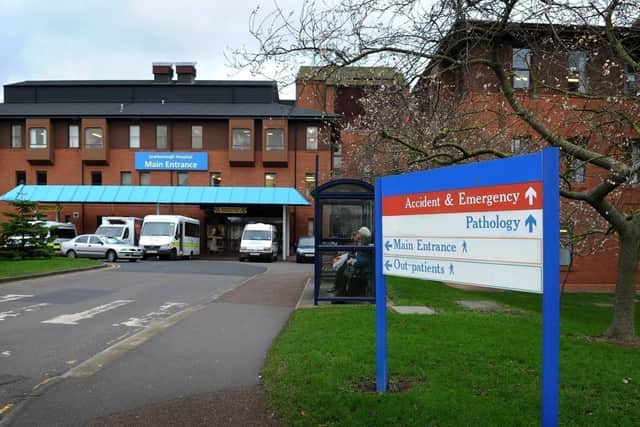Scarborough mother with spinal condition has to travel four hours for ten-minute medical appointments as report by Prof. Chris Whitty reveals impact of NHS deprivation on the coast
and live on Freeview channel 276
Cheryl Mann, who lives in the outskirts of Scarborough, has a diagnosed bulging disc condition, meaning two of the discs in her spine are protruding and often hit against her spinal cord resulting in agony.
Compounded with fibromyalgia which she also suffers from, her chronic condition can be debilitating and leave her bed-ridden.
Advertisement
Hide AdAdvertisement
Hide AdBut due to the lack of pain specialists at Scarborough General Hospital (SGH), combined with the fact neither Ms Mann nor her partner, Nick, can drive, she faces regular journeys to Bridlington Hospital for appointments to monitor her condition.


Her plight was revealed as a report by the Government's Chief Medical Advisor, Prof Chris Whitty, has laid bare the impact of a lack of investment in frontline health care on rural communities and coastal towns like Scarborough.
Residents in the town have expressed concerns that many of the local hospital's services, such as breast cancer care and, more recently, stroke care, are being moved to hospitals in nearby cities like York.
Health Secretary Sajid Javid has said people living on the coast face "clearly different challenges" to those inland, but that everybody should have equal access to healthcare, and has agreed to consider recommendations made by Prof Whitty.
Advertisement
Hide AdAdvertisement
Hide AdMs Mann, 34, said she faces a two-hour journey involving three buses each way to get to her appointments currently, although sometimes is kindly offered lifts by friends or a family member.


“I was going every week for physiotherapy because we don’t have a pain management team in Scarborough,” she told The Yorkshire Post.
“The whole thing can take five hours out of my day for an appointment that can take minutes.”
Ms Mann has two daughters, Lillimay and Lexi, so has to factor in getting home in time for school runs.
Advertisement
Hide AdAdvertisement
Hide AdShe added: “I did have to travel to Hull for six weeks at one point to see the chiropractor ー that was every week. That takes up the whole day if I have to take the train.”


The gravity of the situation on Ms Mann’s mental health has impacted her to the point where she has had to quit her business she set up trading craft supplies for children.
“I had worked really hard and got funding from the lottery, so it was very difficult to give it up,” she says.
The pandemic, she adds, has amplified the difficulty of navigating her way to crucial appointments, as travelling to hospitals and back on multiple forms of public transport is a risk.
Advertisement
Hide AdAdvertisement
Hide Ad“The night before appointments I’d find myself unable to sleep. I woke up one morning and had to cancel it as my anxiety was so bad,” she said.


“I’ve been to around 30 or 40 of these appointments now in Bridlington, and I’m always worried my fibromyalgia will flare up.
“When I am in that amount of pain, I will struggle to get out of bed and to the toilet without help. So a two hour journey on three buses and back is out of the question.”
Ms Mann is not alone in her difficulties in accessing important medical appointments.
Advertisement
Hide AdAdvertisement
Hide AdPensioner Ali Wilkins, who lives in Seamer on the outskirts of Scarborough, says services at SGH have been moved “in dribs and drabs” to York Hospital over recent years.
Ms Wilkins was diagnosed with breast cancer in 2006 and has been in remission for several years, but has had to travel to York for mammograms.
“It is a beautiful clinic they have in York, but I don’t see why we couldn’t have some aspects of that here on the coast,” she said.
“I’ve got deep concerns that more and more things are moving away from Scarborough. It really has affected my family.”
Advertisement
Hide AdAdvertisement
Hide AdMs Wilkins’ daughter Clare, 40, has cerebral palsy, and although consultations with neurologists over in York are able to be done over the phone, she worries that they will have to attend increasing numbers of appointments in other cities like Hull and York, as travelling in a wheelchair can be incredibly burdensome.
“It’s the time taken to get there, the wait there, and how that affects her that is the problem,” Ms Wilkins said.
“It’s like a planned operation going away for appointments.”
Care for stroke patients has been the most recent limb of SGH to be moved to its nearest city, and last month the town’s MP Robert Goodwill last month backed the plans from York and Scarborough Teaching Hospitals NHS Trust for this to become a permanent move.
Advertisement
Hide AdAdvertisement
Hide AdBefore this, patients would be taken to Scarborough for a scan and emergency treatment, then taken the 40-minute ambulance journey to York in what was termed a “drip and ship” model.
Last year, the decision was made on safety grounds to take patients directly to York and this looks to become a permanent change.
Stroke patient Cathie Agars, 56, suffered a second bleed to the brain in March after having had a first four years earlier.
The stroke was only picked up by chance after she was experiencing continuous head pain which she put down to having her second Covid vaccine.
Advertisement
Hide AdAdvertisement
Hide Ad“As soon as I got there within 15 minutes they had me in for a scan and then put me in an ambulance to blue light me over to York,” she said.
“I had all the treatment I needed there and I can’t fault it ー it was excellent.”
Ms Agars was discharged four days later and taken home in a private ambulance, and has had regular consultations since March.
She added: “Once things pick up, I will need to go to York for my aftercare.” Luckily, for Ms Agars, it is a journey she is happy to take.
Advertisement
Hide AdAdvertisement
Hide AdBut Conservative MP Robert Goodwill, in a meeting last month, expressed concerns from constituents that they will not be able access treatment closer to home.
“I have had quite a lot of letters from people concerned that they would like to go to Scarborough to get their stroke seen, [but] all the evidence is that the expertise, the equipment and the amount of treatments the doctor needs to be delivering all point to a regional unit,” the MP told a North Yorkshire County Council meeting.
“I think the reassurance we would like from the health service locally is that some treatments may be withdrawn because of budgetary issues and that is something I am quite worried about.”
A public meeting is due to be held next month to discuss the future of stroke care for the town’s habitants.
Advertisement
Hide AdAdvertisement
Hide AdBut, for now, many continue to worry what the future holds for accessing health care that does not entail long journeys to other towns and cities.
“It’s the older generation I worry about,” Ms Mann added.
“They may not have people around them to support them. The worry caused by an illness then the extra worry of travelling to these appointments could be too much and they won’t go. And that’s heartbreaking to think about.”